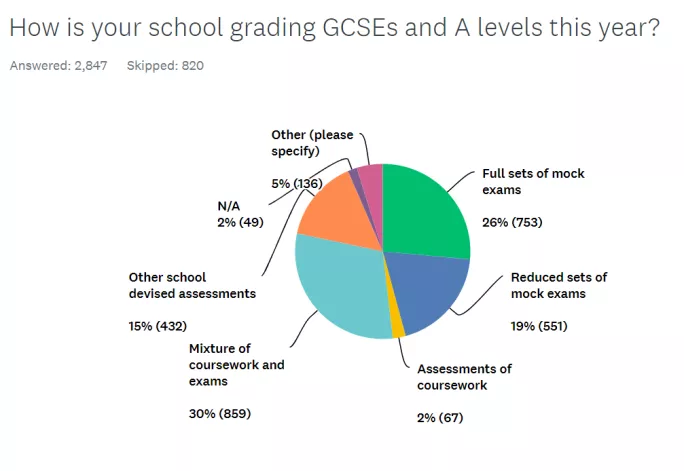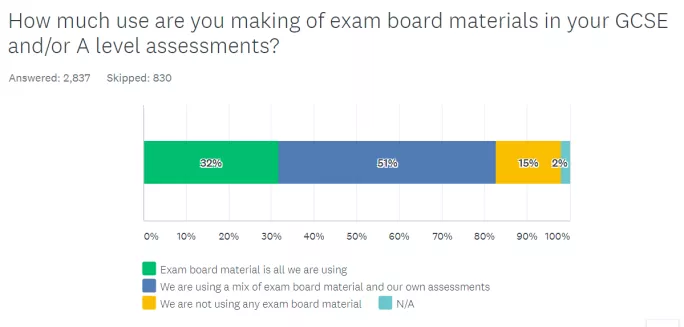
Revealed: Huge differences in GCSE grading approaches

Schools have adopted a wide range of methods to grade this year’s GCSEs and A levels, a Tes survey reveals.
Solutions range from full sets of mock exams to coursework and assessments that schools have devised themselves, with no single approach dominating.
The poll also shows that the majority of schools did not use exam board assessment materials exclusively, with many teachers commenting that the exam board-produced tests were inadequate.
The news comes on the deadline day for schools submitting their grades to exam boards in a process that has already encountered problems.
Exclusive: 2021 GCSE grades not ‘fair’, say teachers
Exclusive: Parents push teachers to raise GCSE grades
GCSEs 2021: Most teachers lose at least a week grading
Exclusive: 94 per cent of teachers grading GCSEs report ‘problems’
GCSEs: Teachers criticise ‘shocking’ exam material

In the survey of more than 2,800 grading teachers, just over a quarter said they had used full sets of mock exams to assess students, while one in five - 19 per cent - said their school had used reduced sets of mock exams.
And 30 per cent said their school had used a mixture of coursework and exams, while 15 per cent had used other, school-devised assessments.
The survey also reveals that most teachers had not opted to use exam board assessment materials alone as a basis for the grades.

Just under a third - 32 per cent - of respondents said they were only using exam board materials to assess students, while 51 per cent said they were using a mixture of exam board papers and their own assessments.
And 15 per cent of respondents said they were not using any exam board materials to arrive at grades.
GCSEs and A levels 2021: ‘Every school is using different grading measures ’
These proportions were very similar in private schools, with 31 per cent reporting they were only using exam board materials, 53 per cent a mixture and 14 per cent not using any exam board assessments at all.
Many teachers responding to the survey expressed doubts about how the wide range of approaches used by schools would lead to fair and consistent grades.
A state head of department marking arts-based subjects said: “Every school is using different measures - ie, some schools operating a consistent range of non-stop exams, other internal class assessments, others using exam-type questions with access to textbooks.
“No, the system is not going to be fair. It would have been better to simply have used the teacher-assessment system from last year and allow for professional judgement.”
And a deputy head grading humanities in a private school said that the guidelines had led to “gross discrepancies in how schools and departments interpreted the guidance”.
The Joint Council for Qualifications (JCQ), which represents the UK’s largest exam boards, has previously said that “teachers have the flexibility to choose from a range of evidence” when compiling grades this year.
Teachers also commented that the exam board assessment materials had been issued too late and were unhelpful.
Tes previously reported on teachers’ criticism of “shocking” exam board materials, as well as the vagueness of the grade descriptors issued by the Joint Council for Qualifications.
An English head of department in the state sector said they were using “previous exam papers - not the ridiculous ‘assessment materials’ the exam boards claim they’ve made”.
And a state English and drama teacher said: “The exam materials that the exam boards provided are a cut-and-paste of past exams - therefore the students that are clued up are able to find the mark schemes and grading online. Therefore we have had to do a mixture so cheating and unfairness doesn’t occur/is reduced.”
Kevin Courtney, joint general secretary of the NEU teaching union, said: “All grading policies at every school and college have been signed off by the exam boards as an appropriate and fair way to award grades based on the evidence of student performance that is relevant within their setting.
“This has nonetheless been a burdensome process for schools and colleges, which could have been made a good deal easier by a government that instead squandered many months in denial of the need for a Plan B [in case exams had to be cancelled]”
Geoff Barton, general secretary of the Association of School and College Leaders, said: “One challenge of the system is how to ensure standards are consistent when a wide variety of assessment methods are used. This is done by methods such as the use of grade descriptors and exemplification, and it is backed up by internal and external quality-assurance processes.
“It would have obviously been easier in this respect if a standard set of assessments had been sat by all pupils. But this would have been exams by another name and would have created the same problem as the public exams that were cancelled, namely that pupils have experienced greatly varying degrees of disruption and a standard assessment would not have been fair to those who experienced greater learning loss.
“Flexibility was built into the system to allow schools and colleges to tailor their assessments accordingly, and while this clearly creates challenges, it was widely felt to be the fairest way to proceed.”
A spokesperson for the exam boards’ Joint Council for Qualifications said: “JCQ and the exam boards recognise how much the additional workload and other challenges caused by the pandemic are impacting teachers and the tremendous pressure that they face.
“The guidance we developed, in line with the Department for Education and Ofqual’s requirements, made clear the exam boards’ additional assessment materials are an optional part of the range of evidence to support the determination of student grades by schools and colleges this summer.
“This demonstrates the flexibility of this summer’s awarding arrangements, as teachers have been able to choose how they gather evidence and consider how much content their students have been able to cover.
“At every stage, we have tried to, and have continued to, turn around guidance and materials as quickly and clearly as possible. We are only able to do so once we have received decisions from Ofqual and government, which they needed to publicly consult on.”
An Ofqual spokesperson said: “Our approach to teacher-assessed grades has meant that school leaders and teachers have had the flexibility to decide on the evidence they used to determine grades for their students.
“This flexibility was deliberate, to recognise that not all students had been taught the whole course, that not all students could be assessed at the same time and to allow existing evidence to be used where appropriate.
“Exams were cancelled in January and the following month we published information and guidance about how grades would be determined. We encouraged schools and colleges to continue teaching for as long as possible before conducting assessments. The exam boards published in March a wide range of materials to support teachers assessing their students.”
“We consulted on the detail of the government’s teacher-assessed grades policy and developed the detail in light of more than 100,000 responses. Given the circumstances of the pandemic, each school has been able to choose an approach that works best for their circumstances, based on what their students have been taught.”
A Department for Education spokesperson said: “Teachers know their students best, which is why we have given schools and colleges the flexibility to determine how best to assess their cohorts, and JCQ and exam boards published extensive guidance to support them with assessments, marking and their judgements.
“There is also robust quality assurance in place for this summer’s assessments, including internal checks within schools and colleges, and external checks by exam boards, to ensure that grades are awarded as fairly as possible.”
You need a Tes subscription to read this article
Subscribe now to read this article and get other subscriber-only content:
- Unlimited access to all Tes magazine content
- Exclusive subscriber-only stories
- Award-winning email newsletters
- Unlimited access to all Tes magazine content
- Exclusive subscriber-only stories
- Award-winning email newsletters
You need a subscription to read this article
Subscribe now to read this article and get other subscriber-only content, including:
- Unlimited access to all Tes magazine content
- Exclusive subscriber-only stories
- Award-winning email newsletters
- Unlimited access to all Tes magazine content
- Exclusive subscriber-only stories
- Award-winning email newsletters
topics in this article



